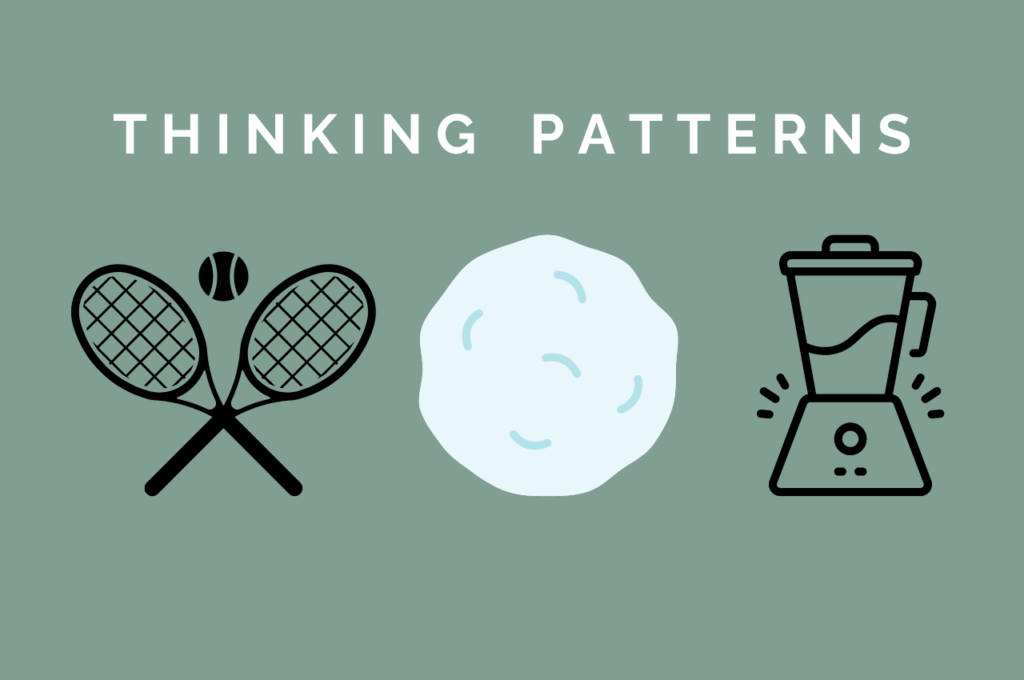It has been found that our brain can process up to 70,000 thoughts a day, with signals travelling at 300 miles / hour (Cleveland Clinic). It is no wonder that you hear people say, ‘I just got caught up in my thoughts,’ with that number being processed per day. Despite this huge number, I know that there are many of us that would like to ‘quieten’ our minds. Colloquially we are called the ‘overthinkers’ and below I have the three common patterns of thinking.
- Mental tennis: this occurs when we have a conflict about a decision that needs to be made. We will go continually backwards and forwards to try to reach the best solution and gain some clarity. However, the more we go backwards and forwards, the more we stress our system out and the further from clarity we become. To give an example of this, here is someone deciding whether to attend a wedding, ‘I want to go because I enjoy weddings so much but it is a 5 hour drive, I guess I could take the day off before work, then that would mean using up a holiday day, I haven’t seen her for 2 years though and this would be a perfect opportunity. It is expensive though with accommodation and buying a gift and an outfit, I guess I could reuse an old outfit, but what if someone has seen me in that before ….” and so on. Here you notice that the person is just going backwards and forwards without deciding at all, there is a real conflict without reaching any clarity.
- Snowball thinking: here a person will start with a small anxiety or concern, think of this as the size of a snowflake. As the person begins thinking about this concern, it is getting bigger and bigger in their minds, until it reaches the size of a huge snowball. The thoughts are gathering with both pace and substance, so that by the end, the thought has turned into the worst-case scenario. Let’s take the wedding example, ‘I think it is best that I don’t attend the wedding, but will my friend (the bride) think I don’t care? Maybe she won’t talk to me if I don’t go, maybe this will mean the end of our friendship. The bride will then tell all of our friends in our group and then I will lose all of them as my friends too. I will be excluded from all their future weddings and social gatherings, I will end up alone.’ Here you can see that the original concern has gone from not attending the wedding to losing all her friends and ending up alone.
- Mind blending: this isn’t necessarily about negative thoughts but more the speed and the quantity of thoughts. Our thoughts can be anything such as planning, replaying or jumping between thoughts. The actual content of these thoughts becomes unimportant, but our system becomes wired and irritated, becoming harder to switch off. An example, ‘I need to start making dinner at 5pm, if I put the water on whilst chopping the vegetables then that will save some time, I still cannot believe I sneezed so loudly in that work meeting today, I must remember to buy toilet paper tomorrow, it’s raining again, guess that means I don’t need to get the car washed yet, speaking of washing, I need to put a wash on soon so that will dry for the morning, I didn’t buy lemon for this recipe, will it taste as good now? Shall I maybe do something else? Goodness me that sneeze was so loud, did anybody laugh at me? …’ and so on. Here you will see that it is just a lot of thoughts without any real meaning behind them, becoming scrambled up.
If you feel as though you can resonate with one or more of these patterns, then I suggest that you start to recognise when this is occurring in real time. Then take a deep breath and count to five. This will allow you to notice yourself in the present moment and step out of your thoughts. Giving yourself a moment’s pause. If after this you still go back to where you were in your thoughts, then try writing it down, writing it down on paper will take away the intensity in the mind. Slowing our thoughts down and not getting caught up in these repetitive loops can have a really calming effect on the body, allowing us to live more peacefully.
Please always feel free to get into contact with me if you need some extra support and guidance.
Rachel


0 Comments